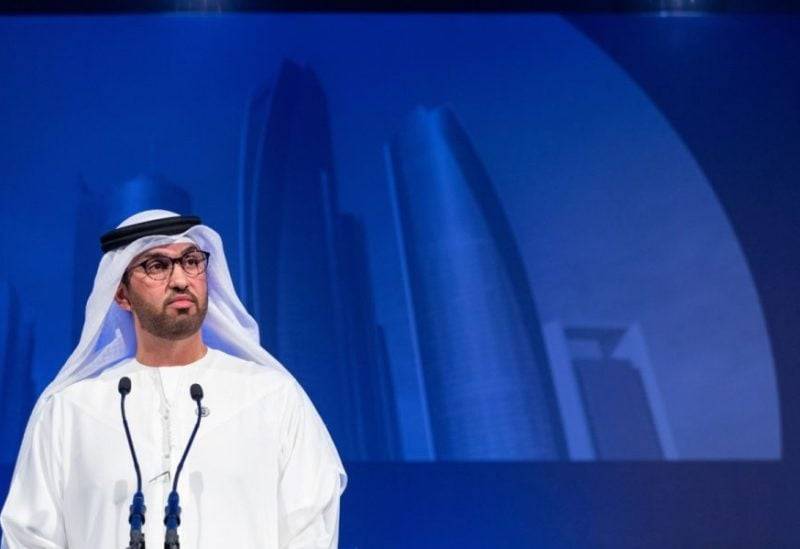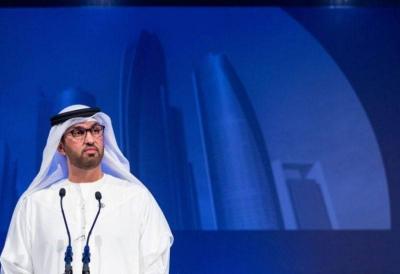The President of the United Arab Emirates for the United Nations Conference on Climate Change (COP28), Sultan Al Jaber, urged countries to maintain momentum and conclude the summit on schedule after what he described as a week of historic progress, ahead of the most challenging stage of negotiations. In a speech late Wednesday, Al Jaber praised delegations from nearly 200 countries for their agreement on the opening day of the two-week summit regarding the "loss and damage" fund to assist nations affected by climate-related disasters. Countries, companies, and charitable organizations pledged to raise climate funding amounting to $83 billion, which Al Jaber told delegations "can only raise standards."
Al Jaber continued, "What we have all achieved in just one week, in my opinion, is nothing short of historic. Over seven days, we demonstrated that multilateralism is truly successful and is performing well."
**Rest Day**
While a calm settled over the summit area today, Thursday, as negotiations were officially suspended for a "rest day" in the summit's schedule, delegations worked to reach a final agreement at COP28 by the scheduled conclusion date of December 12. As the summit resumes tomorrow, Friday, countries will begin discussing the finer details, and Al Jaber is expected to lay out the work plan for the second week, including the goal to finish the summit as planned. This would be an achievement that UN climate talks have not accomplished since COP9 in Milan, Italy, 20 years ago.
Data and reports from the Carbon Brief website indicated that eight out of the last ten COP meetings have extended their duration by at least 24 hours, including COP27 last year in Egypt and COP26 that preceded it in Glasgow. In the final phase of COP28, negotiations will focus on some of the most challenging issues this year.
**Global Assessment**
For the first time, countries are tasked with a significant mission: assessing progress made on climate issues so far and what remains to be done. The work, known as the "global stocktake," is expected to lead to future public policy action plans from governments to prevent the worsening of climate change to extreme levels. Draft texts so far present several viable options for national climate plans, indicating that ministers must resolve the issue of absence of consensus.
Observer Kiersa Kaspshik stated, "They still have a lot to accomplish in order to provide the political markers that will realign the path toward achieving the goals of the Paris Climate Agreement and keeping the 1.5-degree Celsius target within reach." Kaspshik is the Climate Policy Director at Conservation International.
**Phasing Out?**
European Union member states, totaling 27, along with Chile and others, want the final COP28 agreement to explicitly call for the phase-out of fossil fuel use without language that would allow countries to rely heavily on carbon capture and storage for that goal. Chile's Environment Minister Maisa Rojas, who is also a climate scientist, urged her counterparts from other countries not to defer the issue for years to come. Rojas told Reuters regarding the phase-out of fossil fuels, "It is certainly necessary. We have known that for a long time."
To circumvent objections from Saudi Arabia, Russia, and other nations whose economies rely on oil and gas, negotiators are searching for an alternative formulation to indicate phasing out fossil fuels by the fourth decade of the new millennium. The phrasing of "phase-down/phase-out" has become a contentious point for nations that produce oil, gas, or coal. An observer of the negotiations noted that Trinidad and Tobago, a member of the Alliance of Small Island States, suggested that the phrasing be "phase-out of fossil fuels in line with the best available science and the principles and provisions of the Paris Agreement." Catherine Abreu, founder of the non-governmental organization Destination Zero, stated, "I expect we will see some creative wordplay."
**Climate Funding and Adaptation**
Since the adoption of the loss and damage fund agreement on November 30, Al Jaber stated that countries have raised over $726 million to capitalize the fund, and more is expected to be contributed by the end of this year's COP summit. However, progress on climate adaptation has stalled, as ministers need to resolve a deadlock concerning commitments from wealthy countries versus poorer nations to finance the fund. They will also need to address how to enhance climate funding.
Pledges made at COP28 still fall far short of the hundreds of millions needed annually to help developing nations adapt to a warming world, including rising sea levels and increasing severity of heatwaves. Developing countries also need annual funding amounting to billions, if not trillions, of dollars to transition to clean energy. Teresa Anderson, who leads climate justice efforts at the non-profit organization ActionAid International, remarked, "The issue of funding is particularly important because developing countries are understandably hesitant to be burdened with global targets they do not have the means to fulfill."




